Unit 8 Lesson 47 Good Manners 课件(26张PPT)
文档属性
| 名称 | Unit 8 Lesson 47 Good Manners 课件(26张PPT) |
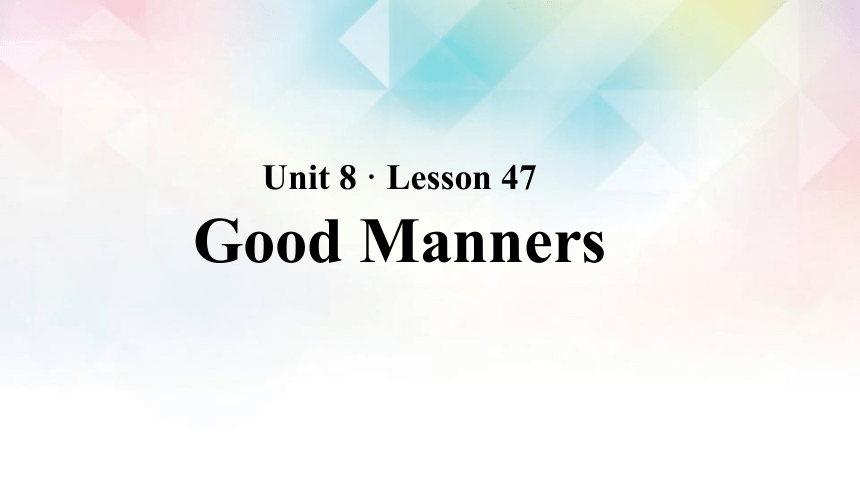
|
|
| 格式 | pptx | ||
| 文件大小 | 2.0MB | ||
| 资源类型 | 教案 | ||
| 版本资源 | 冀教版 | ||
| 科目 | 英语 | ||
| 更新时间 | 2020-05-11 00:00:00 | ||
图片预览

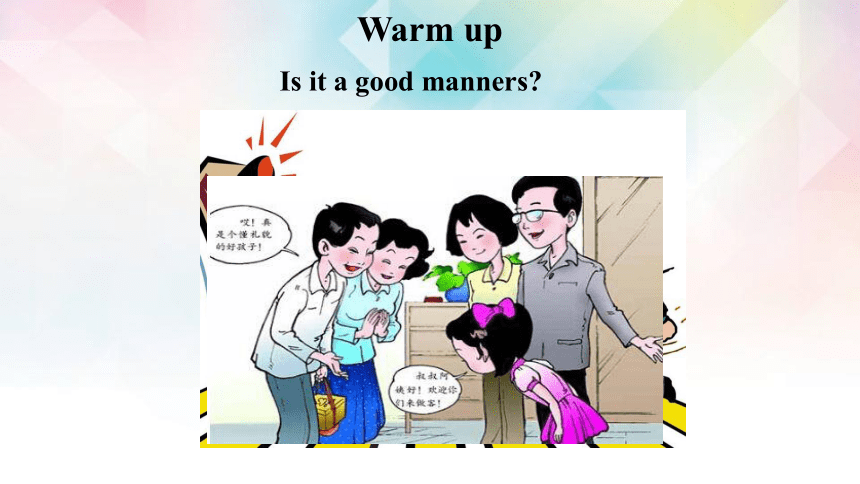
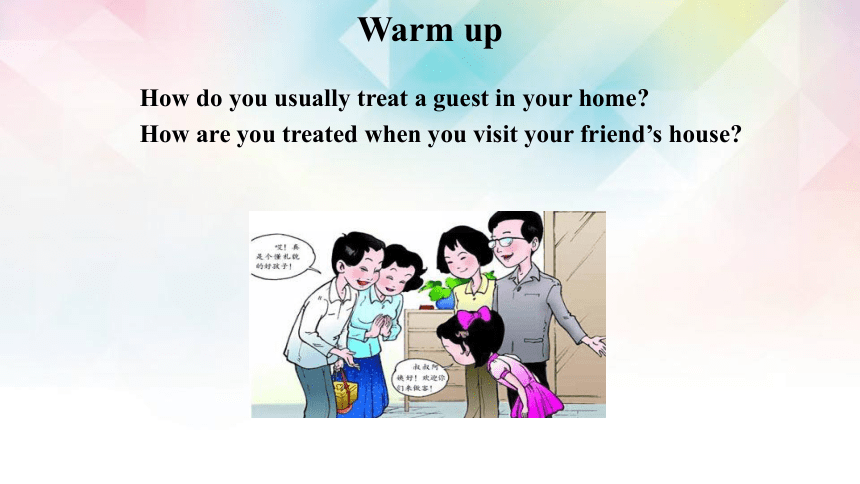



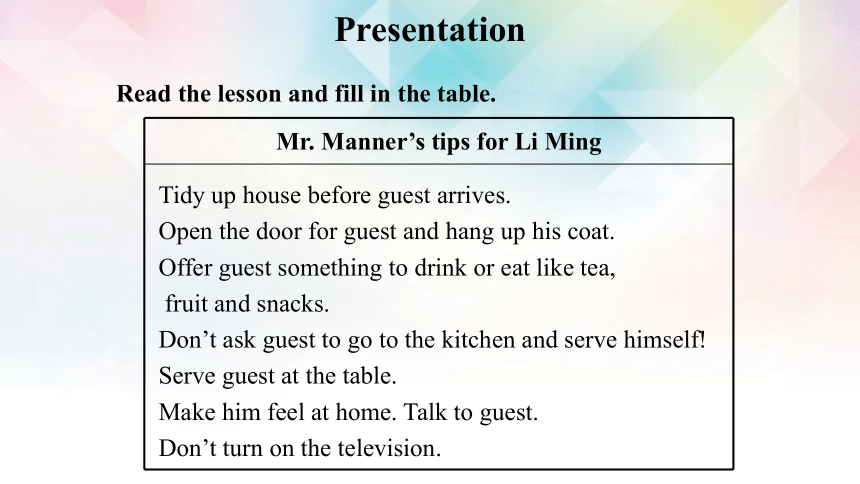
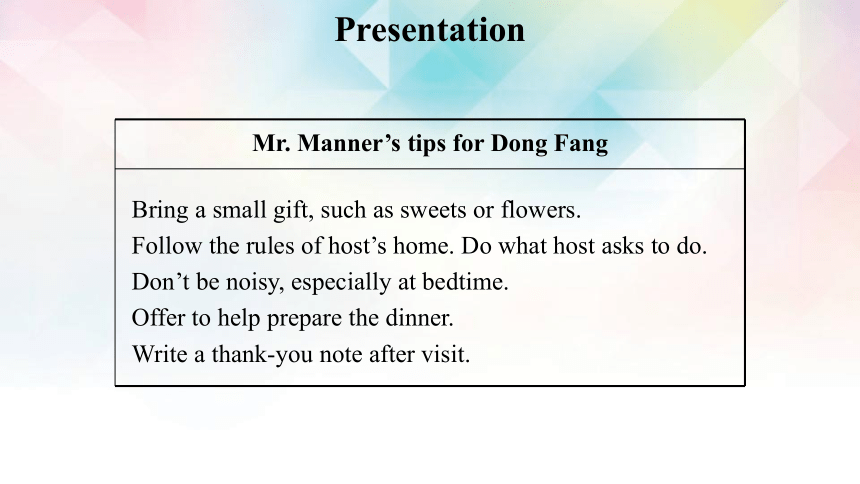
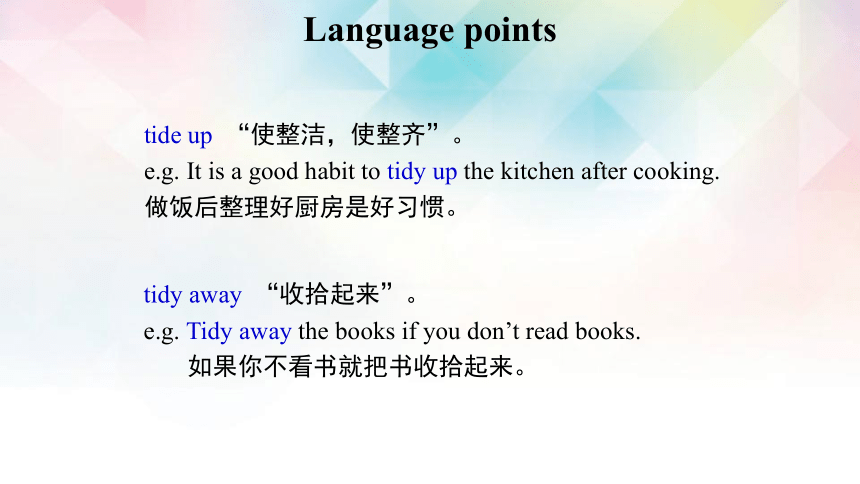
文档简介
(共26张PPT)
Unit 8 · Lesson 47
Good Manners
Is it a good manners
Warm up
How do you usually treat a guest in your home
How are you treated when you visit your friend’s house
Warm up
tidy
整洁的,整齐的,整理
New words
Russian
俄罗斯人,俄语
New words
noisy
吵闹的,喧闹的
New words
Mr. Manner’s tips for Li Ming
Tidy up house before guest arrives.
Open the door for guest and hang up his coat.
Offer guest something to drink or eat like tea,
fruit and snacks.
Don’t ask guest to go to the kitchen and serve himself! Serve guest at the table.
Make him feel at home. Talk to guest.
Don’t turn on the television.
Read the lesson and fill in the table.
Presentation
Mr. Manner’s tips for Dong Fang
Bring a small gift, such as sweets or flowers.
Follow the rules of host’s home. Do what host asks to do.
Don’t be noisy, especially at bedtime.
Offer to help prepare the dinner.
Write a thank-you note after visit.
Presentation
tide up “使整洁,使整齐”。
e.g. It is a good habit to tidy up the kitchen after cooking.
做饭后整理好厨房是好习惯。
tidy away “收拾起来”。
e.g. Tidy away the books if you don’t read books.
如果你不看书就把书收拾起来。
Language points
offer v. “(主动)给予;提供;出示”,后可以跟宾语或双宾语,能用不定式作宾语,不能用动词-ing形式作宾语。
e.g. My friend offered to lend me lots of money.
我的朋友欣然借给了我很多钱。
I offered my passport at the gate.
我在大门口出示了我的护照。
Language points
offer和provide
offer和provide都有“提供”的意思,但有所区别。
offer通常用来表示主动提供某物,常用于
offer sb. sth. 或 offer sth. to sb. 结构中。
e.g. Can you offer me something to eat
你能给我一些吃的吗?
We should offer seats to the old man on the bus.
我们在公交车上应该给老人让座。
Language points
provide常用来表示提供需要或有用的东西,常用于provide sb. with sth.或provide sth. for sb. 结构中。
e.g. Our parents provide us with everything that we need.
我们的父母给我们所需要的一切。
The restaurant provides good service for its guests.
这个饭店给客人提供最好的服务。
Language points
such as 与for example的区别
such as常用来列举同类人或事物中的多个例子。
e.g. I like animals, such as dogs, bears and pandas.
我喜欢动物,如狗、熊、熊猫。
for example一般只以同类人或事物中的“一个”为例。
e.g. He has ever been to many countries, for example, Australia.
他曾经去过许多国家,如澳大利亚。
Language points
remember to do sth. 意为“记着去做某事”,表示动作尚未发生。
remember doing sth.意为“记得做过某事”,表示动作已经发生。
e.g. Remember to turn off the light when you leave.
离开时记着关灯。
I remember telling you the message.
我记得告诉过你那条消息。
Language points
表语从句:
用一个句子作为表语,说明主语是什么或者怎么样,和系动词一起构成谓语。需要注意:
1. 表语从句一定要用陈述语序。
e.g. This is why he failed the English exam.
这是他英语考试失败的原因。
2. 主句时态和从句时态可以不一致。
e.g. This is what he told us at the metting.
这是他在会议上告诉我的。
3. 引导词是that时,that不能省略。
e.g. The trouble is that we lack lots of money.
困难是我们缺大量资金。
Language points
Circle the correct words to complete the sentences.
1. I said sorry for being too (noisy / noise).
2. The book I read was written in (Russian / Russia).
3. Please (tidy up / divide up) your closet. It’s a mess.
4. Big lights (hung / hanged) from the ceiling. They looked beautiful.
Practice
From Mr. Manners' tips for Dong Fang, we get some suggestions to be a polite guest. Do you have other tips for Dong Fang Work in groups and write down your advice.
Practice
More advice about a visit to a friend’s house:
1. Make an appointment(预约) before you go.
2. Be on time and greet members in the order of age.
3. Ask if you should take shoes off before you walk into the house.
4. Don’t seat yourself before the host tells you where to sit.
Practice
Manners make the man.
举止见人品
Practice
Do you know something about table manners
Chinese dinner table
Western dinner table
Practice
Group work:
Imagine that a Canadian friend comes to visit your house. What should you do to make him or her feel comfortable Make up a dialogue with your partner and act it out!
Practice
Sing a song.
So We Can Be Friends
We welcome you to our home.
You are all our guests.
We’d like to offer you some dinner,
Then a bed to rest.
Extension
We try to keep our culture.
We don’t find it strange.
I would like to learn about your ways,
So we can be friends.
You may find that our home is different from yours.
Would you like something to eat or drink
Would you like some more
Extension
Imagine you visited a Canadian friend’s house yesterday. Write a short letter to your host.
Task tips:
You can thank him for the kind things he did for you. You can also mention some of the cultural differences you experienced in his home.
Extension
1.Listen and read.
2.Finish exercises of this lesson.
Homework
再 见
Unit 8 · Lesson 47
Good Manners
Is it a good manners
Warm up
How do you usually treat a guest in your home
How are you treated when you visit your friend’s house
Warm up
tidy
整洁的,整齐的,整理
New words
Russian
俄罗斯人,俄语
New words
noisy
吵闹的,喧闹的
New words
Mr. Manner’s tips for Li Ming
Tidy up house before guest arrives.
Open the door for guest and hang up his coat.
Offer guest something to drink or eat like tea,
fruit and snacks.
Don’t ask guest to go to the kitchen and serve himself! Serve guest at the table.
Make him feel at home. Talk to guest.
Don’t turn on the television.
Read the lesson and fill in the table.
Presentation
Mr. Manner’s tips for Dong Fang
Bring a small gift, such as sweets or flowers.
Follow the rules of host’s home. Do what host asks to do.
Don’t be noisy, especially at bedtime.
Offer to help prepare the dinner.
Write a thank-you note after visit.
Presentation
tide up “使整洁,使整齐”。
e.g. It is a good habit to tidy up the kitchen after cooking.
做饭后整理好厨房是好习惯。
tidy away “收拾起来”。
e.g. Tidy away the books if you don’t read books.
如果你不看书就把书收拾起来。
Language points
offer v. “(主动)给予;提供;出示”,后可以跟宾语或双宾语,能用不定式作宾语,不能用动词-ing形式作宾语。
e.g. My friend offered to lend me lots of money.
我的朋友欣然借给了我很多钱。
I offered my passport at the gate.
我在大门口出示了我的护照。
Language points
offer和provide
offer和provide都有“提供”的意思,但有所区别。
offer通常用来表示主动提供某物,常用于
offer sb. sth. 或 offer sth. to sb. 结构中。
e.g. Can you offer me something to eat
你能给我一些吃的吗?
We should offer seats to the old man on the bus.
我们在公交车上应该给老人让座。
Language points
provide常用来表示提供需要或有用的东西,常用于provide sb. with sth.或provide sth. for sb. 结构中。
e.g. Our parents provide us with everything that we need.
我们的父母给我们所需要的一切。
The restaurant provides good service for its guests.
这个饭店给客人提供最好的服务。
Language points
such as 与for example的区别
such as常用来列举同类人或事物中的多个例子。
e.g. I like animals, such as dogs, bears and pandas.
我喜欢动物,如狗、熊、熊猫。
for example一般只以同类人或事物中的“一个”为例。
e.g. He has ever been to many countries, for example, Australia.
他曾经去过许多国家,如澳大利亚。
Language points
remember to do sth. 意为“记着去做某事”,表示动作尚未发生。
remember doing sth.意为“记得做过某事”,表示动作已经发生。
e.g. Remember to turn off the light when you leave.
离开时记着关灯。
I remember telling you the message.
我记得告诉过你那条消息。
Language points
表语从句:
用一个句子作为表语,说明主语是什么或者怎么样,和系动词一起构成谓语。需要注意:
1. 表语从句一定要用陈述语序。
e.g. This is why he failed the English exam.
这是他英语考试失败的原因。
2. 主句时态和从句时态可以不一致。
e.g. This is what he told us at the metting.
这是他在会议上告诉我的。
3. 引导词是that时,that不能省略。
e.g. The trouble is that we lack lots of money.
困难是我们缺大量资金。
Language points
Circle the correct words to complete the sentences.
1. I said sorry for being too (noisy / noise).
2. The book I read was written in (Russian / Russia).
3. Please (tidy up / divide up) your closet. It’s a mess.
4. Big lights (hung / hanged) from the ceiling. They looked beautiful.
Practice
From Mr. Manners' tips for Dong Fang, we get some suggestions to be a polite guest. Do you have other tips for Dong Fang Work in groups and write down your advice.
Practice
More advice about a visit to a friend’s house:
1. Make an appointment(预约) before you go.
2. Be on time and greet members in the order of age.
3. Ask if you should take shoes off before you walk into the house.
4. Don’t seat yourself before the host tells you where to sit.
Practice
Manners make the man.
举止见人品
Practice
Do you know something about table manners
Chinese dinner table
Western dinner table
Practice
Group work:
Imagine that a Canadian friend comes to visit your house. What should you do to make him or her feel comfortable Make up a dialogue with your partner and act it out!
Practice
Sing a song.
So We Can Be Friends
We welcome you to our home.
You are all our guests.
We’d like to offer you some dinner,
Then a bed to rest.
Extension
We try to keep our culture.
We don’t find it strange.
I would like to learn about your ways,
So we can be friends.
You may find that our home is different from yours.
Would you like something to eat or drink
Would you like some more
Extension
Imagine you visited a Canadian friend’s house yesterday. Write a short letter to your host.
Task tips:
You can thank him for the kind things he did for you. You can also mention some of the cultural differences you experienced in his home.
Extension
1.Listen and read.
2.Finish exercises of this lesson.
Homework
再 见
同课章节目录
- Unit 7 Work for Peace
- Lesson 37 Don't Fight!
- Lesson 38 Making School a Better Place
- Lesson 39 The Dove and the Olive Branch
- Lesson 40 The UN—Power of Words
- Lesson 41 Jenny's Good Advice
- Lesson 42 Peace at Last
- Unit Review
- Unit 8 Culture Shapes Us
- Lesson 43 A Visit to Chinatown
- Lesson 44 Popular Sayings
- Lesson 45 Different Manners
- Lesson 46 Home to Many Cultures
- Lesson 47 Good Manners
- Lesson 48 Supper with the Bradshaws
- Unit Review
- Unit 9 Communication
- Lesson 49 Get Along with Others
- Lesson 50 Tips for Good Communication
- Lesson 51 What Could Be Wrong?
- Lesson 52 The Power of a Smile
- Lesson 53 Working in Groups
- Lesson 54 How Embarrassing!
- Unit Review
- Unit 10 Get Ready for the Future
- Lesson 55 Look into the Future
- Lesson 56 Manage Your Time
- Lesson 57 Best Wishes
- Lesson 58 Ms.Liu's Speech
- Lesson 59 Keep Your Choices Open
- Lesson 60 Get a Good Education
- Unit Review
